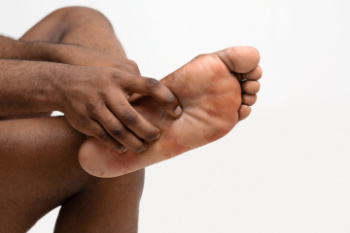
Plantar fasciitis occurs when the thick band of tissue that connects the heel to the toes becomes inflamed. This often leads to sharp or dull pain under the heel, especially in the morning or after standing for long periods of time. Causes of plantar fasciitis include wearing unsupportive footwear, sudden weight gain, prolonged standing, or tight calf muscles. People with flat feet or high arches may be at a higher risk. To manage symptoms of plantar fasciitis, a podiatrist may recommend targeted exercises to stretch and strengthen the foot and ankle. Simple stretches, such as pulling the toes upward to stretch the plantar fascia or performing calf stretches, can improve flexibility and reduce tension. Strengthening exercises, like picking up small objects with the toes, may help improve foot stability. A podiatrist can examine your foot and prescribe orthotics or suggest footwear adjustments to alleviate stress on the plantar fascia. If you are experiencing heel pain, it is suggested that you schedule an appointment with a podiatrist for a diagnosis and treatment options.
Plantar fasciitis is a common foot condition that is often caused by a strain injury. If you are experiencing heel pain or symptoms of plantar fasciitis, contact Joseph M. LaCava, DPM from Arkansas. Our doctor can provide the care you need to keep you pain-free and on your feet.
What Is Plantar Fasciitis?
Plantar fasciitis is one of the most common causes of heel pain. The plantar fascia is a ligament that connects your heel to the front of your foot. When this ligament becomes inflamed, plantar fasciitis is the result. If you have plantar fasciitis you will have a stabbing pain that usually occurs with your first steps in the morning. As the day progresses and you walk around more, this pain will start to disappear, but it will return after long periods of standing or sitting.
What Causes Plantar Fasciitis?
- Excessive running
- Having high arches in your feet
- Other foot issues such as flat feet
- Pregnancy (due to the sudden weight gain)
- Being on your feet very often
There are some risk factors that may make you more likely to develop plantar fasciitis compared to others. The condition most commonly affects adults between the ages of 40 and 60. It also tends to affect people who are obese because the extra pounds result in extra stress being placed on the plantar fascia.
Prevention
- Take good care of your feet – Wear shoes that have good arch support and heel cushioning.
- Maintain a healthy weight
- If you are a runner, alternate running with other sports that won’t cause heel pain
There are a variety of treatment options available for plantar fasciitis along with the pain that accompanies it. Additionally, physical therapy is a very important component in the treatment process. It is important that you meet with your podiatrist to determine which treatment option is best for you.
If you have any questions, please feel free to contact our office located in Hot Springs, AR . We offer the newest diagnostic and treatment technologies for all your foot care needs.
